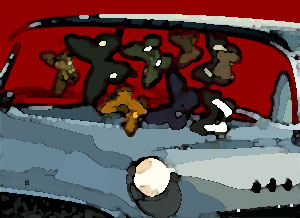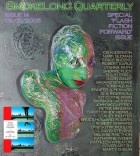The highway had turned tropical and potholed, two narrow lanes and narrower bridges, with butterflies spattering the griliscreen we bought on good advice at the border.
My mother said, “We’re on the wrong road.” The map was flapping and her hair, still blonde then, was flaying, air thudding through the open windows of the Buick. “We’re lost.”
My father sang “On the Road to Mandalay.” Years later my mother said he was sometimes a stranger, after the war, although he never seemed strange to me. He had been in combat both in Europe and the Pacific, but he rarely spoke of it. He worked for an oil company, and we moved often. I was only ten at the time of our vacation, and he died when I was sixteen.
The small patch of tropics, which were not shown on my mother’s map but through which we had been traveling, soon thinned out as we climbed into the desert mountains. We followed a big, backfiring diesel, which we couldn’t pass, and drowsing in the back of the car, in the heat and swaying, I could tell from the backfires when the diesel was leaving us behind as it raced downhill, until it began to labor uphill, and we drew closer again. My father spoke enthusiastically about the great city we were going to, Mexico City, high above everything, ancient and beautiful. Nothing ever changed there. My mother, so practical, consulted guidebooks by the dozen and wrote itineraries. I remember mostly rain and traffic jams.
It was hot and growing dusky when a village appeared below us. Later we found it on the map: Tamazunchale, which my mother pronounced “Thomas and Charlie,” a few whitewashed houses in a dusty bend with treetops shimmering in the last of the sun. Ahead of us the diesel was plummeting toward a one-lane bridge, and around the curve on the other side of the village a small green pickup suddenly appeared, flashing its headlights. But the diesel barreled onto the bridge at top speed, not trying to slow at all, so that the pickup, in order to avoid disaster, was forced into a skid on the village side. It flipped and rolled, and as the diesel shot past, the pickup slammed finally onto its side in a wave of dust and gravel.
“God, oh God.” We followed slowly downhill in the Buick. When we crossed the bridge, the dust swallowed us, then as it cleared on the other side we saw the underside of the pickup. Some villagers had already reached it. Others were still running, village women with their skirts clutched up, crying out. There was a strong smell of Pemex gasoline and around one of the tires was a pale flame. One of the men, wearing white campesino pants but barechested, stretched down into the skyward window, while others held his ankles, and fetched up a howling infant.
“We’ve got to stop,” my mother said.
Probably there was a farm family in the pickup, which had pink and green tassles and curtains painted on the inside of the windshield, a decoration common to many Mexican trucks. We had slowed almost to a stop, but not entirely. We were going on.
“They need help,” my mother said.
“They’ve got help,” my father said.
“We could take them to a hospital,” my mother said.
“They’ll call for help,” my father said.
I watched through the rear window, the villagers crowding around. There were streaks of black in the dust cloud, but never an explosion—just the billowing, huge and serene.
“But what if there’s no telephone?” my mother said. “How will they call for help?”
The diesel must have continued up the mountain. It had not stopped to render aid. It was nowhere in sight.
“You don’t know what could happen,” my father said. “You don’t understand, do you?”
My mother was not a hysterical woman. If there were shouts and tears I don’t remember them. If she had doubts, as she always did, about everything in her life, she took refuge in my father’s direction.
“They’ll think it’s our fault,” she said reasonably. “They’ll come after us. They’ll throw us in jail.”
My father began to sing “On the Road to Mandalay.”
My mother’s map flapped furiously. Later she gave him some water from the cap of the big thermos she kept at her feet. When we traveled nights, there were always the embers of the cigarettes they passed between them.
I watched all the way to the top of the mountain. In the evening light, rising above the village, the dust was like a pink bomb blast: a great, unfolding flower. I understood only that my mother and father were lost.
This story was originally published as “Tamazanchale” in The Literary Review. It appears here by permission of Robert Shapard.



 The core workshop of SmokeLong Fitness is all in writing, so you can take part from anywhere at anytime. We are excited about creating a supportive, consistent and structured environment for flash writers to work on their craft in a community. We are thrilled and proud to say that our workshop participants have won, placed, or been listed in every major flash competition. Community works.
The core workshop of SmokeLong Fitness is all in writing, so you can take part from anywhere at anytime. We are excited about creating a supportive, consistent and structured environment for flash writers to work on their craft in a community. We are thrilled and proud to say that our workshop participants have won, placed, or been listed in every major flash competition. Community works.